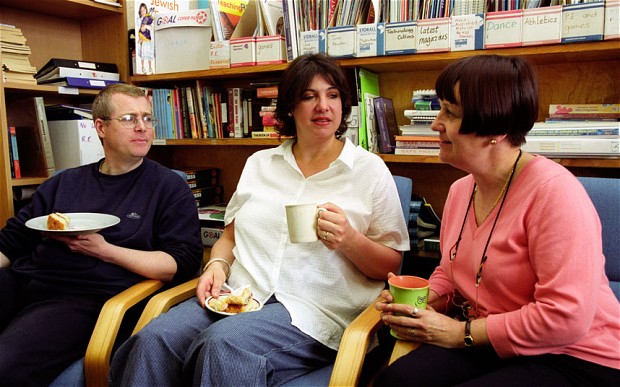
“So much of what we call management consists in making it difficult for people to work.” (Peter F Drucker)
If you have read any of my blogs of recent months, then it won’t come as very much of a surprise to you to discover that I am about to embark on what is likely to be an epic battle with my school management team over their lesson observation procedures and requirements.
The management structure at my school is a constant source of bafflement and bemusement to me: Each small centre has two deputies and a Centre Manager. In addition to this there is also a teacher with responsibility for ‘additional needs’ (SEN). In the case of my centre, this only leaves three teachers, the cleaner, the support staff and the admin officer who aren’t in possession of a ‘management position’.
My vocal gripes about the lesson observation process have recently drawn the attention of a higher management layer: I am now being asked to communicate my concerns to one of the ‘area managers’. These are the league above the ‘Centre Managers’; but not as senior as the top management group: the ‘Assistant Heads’ who are, of course, below the ‘Head teacher’. Following two lengthy verbal exchanges, the ‘Area Manager’, who oversees our centre and one other, has now asked me to outline my concerns in an email.
This I duly wrote; then doubted myself; then decided to seek some union advice before sending. I can’t pretend that the chat I had with my local union office made me feel an awful lot better. The conversation largely seemed to consist of worrying sound bites like “can of worms” “scuppering career” and “capability hearings”. As this is sure to be just the beginning of the process: they have “opened a file”. Ominous. They have also strongly advised me to get the support of my colleagues (“safety in numbers”).

My colleagues, on the other hand, seem to feel equally strongly about keeping their noses clean. And who can blame them? Many of them are being highly paid to occupy pseudo-management positions, keep the home-fires burning and parrot, enthuse about, chant and chime the nonsense that they are pretending (or naive enough) to believe we should be doing. Unsurprisingly, then, not many seem particularly keen to join me in a ‘battle royal’ pointing out the falsehoods and fripperies of the system which underpins their careers, ethos and livelihoods. Anyway, here is the text of the email I am due to send, but still haven’t, as yet:
‘Hi …..,
An email to clarify the main points of our conversation, as per your request. Firstly, let me stress that I would be delighted to go and see other **** teachers teach, and share ideas and good practice with them. In fact, I feel that this would be highly beneficial for all teaching staff. My concerns lie in doing this with the stigma of a teacher who is perceived to be ‘requiring improvement’ attached. I did also mention that I felt it would be beneficial for me to see an outstanding lesson delivered with the same group as I was observed teaching.
In relation to the above, I have now had a chance to read the information you directed me to in the ‘Ofsted Folder’ I am somewhat alarmed to see that the support programme is triggered after just one lesson observation being graded as ‘requires improvement.’ As I said to you, I would have hoped if there were any serious concerns about my ability as a teacher, you would have raised them with me before now. I have always understood myself to be highly competent as a teacher and also very skilled at dealing with the difficulties and challenges that many of our young people present.
As I stressed to you, I am very concerned about the effect that this grading may have on my reputation as a teacher, especially if I then go on to achieve a second ‘requires improvement’ rating in my next observation.

Could you clarify what the procedures are if this were to be the case? As I mentioned to you, it is my understanding that OFSTED are no longer looking for a particular style of teaching, or lesson structure. I showed you the following quote from Sir Michael Wilshaw’s speech:
‘OFSTED should be wary of trying to prescribe a particular style of teaching, whether it be a three part lesson; an insistence that there should be a balance between teacher led activities and independent learning, or that the lesson should start with aims and objectives with a plenary at the end’
I said that was awaiting confirmation and clarification of this from an OFSTED Lead Inspector. She has now sent me the following current guidelines (her summary):
‘Lesson obs – remember these phrases are from the current school inspection handbook Sept 2013: Lesson observations (P10- 13) The key objective of lesson observations is to evaluate the quality of teaching and its contribution to learning, particularly in the core subjects. Inspectors must not advocate a particular method of teaching or show preference towards a specific lesson structure. As such, inspectors will not look for a preferred methodology but must record aspects of teaching that are effective and identify ways in which teaching and learning can be improved. Inspectors will not expect teachers to prepare lesson plans for the inspection. However, they will use the evidence gathered from lesson observations to help judge the overall quality of the school’s curriculum planning.
32. As noted above, inspectors must not advocate a particular approach to teaching or planning lessons.
*Note: The descriptors should not to be used as a checklist. They must be applied adopting a ‘best fit’ approach which relies on the professional judgement of the inspection team. Inspectors must not expect teaching staff to teach in any specific way. Teachers should decide for themselves how to teach so that children are engaged in lessons, acquire knowledge and learn well. Not all aspects of learning, for example pupils’ engagement, interest, concentration, determination, resilience and independence, may be seen in a single observation.
126. Inspectors’ direct observation must be supplemented by a range of other evidence to enable inspectors to evaluate what teaching is like typically and the impact that teaching has had on pupils’ learning over time. Such additional evidence may include:
*discussions with pupils about the work they have undertaken and their experience of teaching and learning over longer periods
*discussion about teaching and learning with teachers, teaching assistants and other staff *the views of pupils, parents and staff
*the school’s own evaluations of the quality of teaching and its impact on learning
*scrutiny of pupils’ work, with particular attention to:
how well and frequently marking, assessment and testing are used to help teachers improve pupils’ learning
the level of challenge provided
pupils’ effort and success in completing their work and the progress they make over a period of time.
I hope that helps. With difficult pupils, such as those in a PRU, and even in mainstream, not all pupils will make the progress that their peers will because of their circumstances. Having case studies to show why this is so is important, plus being able to show what is being done to try and rectify the situation. Having evidence of progress over time to show is vital. Show which interventions have worked. Good luck – kind regards’
I hope that the information above is useful and also that it may go some way to explaining some of my frustration regarding the current observation criteria that **** are using. I fully understand and accept that teachers must be subject to some scrutiny, but I do question the usefulness and accuracy of such ‘snapshot’ judgements, especially when viewed in isolation. Finally, I recall that you mentioned there may be an instance in which I would be subject to more frequent observations. Could you please remind me what those circumstances would be? Thank you.‘

I would be very grateful for any comments or advice on this matter. I am now getting to the point where I can’t quite see the wood for the trees any more. I am fully prepared to battle this issue to its natural conclusion; but it does feel like a lonely place at times.
The NUT, nationally, have taken up the matter, with a request to an official to provide me with assistance in preparing a motion to put to the general meeting of the union locally to “support members who are trying to follow union policy on performance management, which is obviously a big issue in the current climate…”
Fingers crossed….
Please follow me on Twitter: @cazzypot and like my Facebook Page, Cazzypot.


Reblogged this on The Echo Chamber.
LikeLike
Reblogged this on Speaker's Corner.
LikeLike
That’s a very good e mail. What has the union said nationally? (it sounds as if your local area are being a bit defeatist). And have you shown it to other colleagues in the whole service? I know you’ve said people in your section are a bit lukewarm, but there may be others who will have the courage to stand behind you if you lead the way. A motion to the local branch might help in making you feel less lonely and give you others in your area to turn to for support even if it doesn’t actually result in much practically. If you’re prepared to fight to ‘its natural conclusion’ then do it – it’s quite likely that that conclusion will be a change in policy from your institution. For me the worse thing about this type of SLT ‘leadership’ is the complete lack of agency it gives to staff, it is empowering and makes us less good at our jobs. Challenging the nonsense is way less debilitating than putting up with it and letting it drag us down – sometimes into serious physical and mental ill health. Get yourself a local ‘support’ group and go for it!
LikeLike
Thanks for your comment. I’ve just been in touch with a colleague who is much more union-savvy than I am. I have tentatively suggested that we might get the school union rep to call a meeting to gauge feeling across school. Nationally: I’m advised to get safety in numbers. Watch this space.
LikeLike
“Play the game,” is what people always say to me, and they’ve been saying it for a long time. Someone said it to me last week, and I said, “I’m 51 next week and I’ve not played the game so far, and I’m not going to start now.” People who go into management would never admit to surrounding themselves with yes-people, but that’s what happens. Anyone who dares to question the orthodoxy makes themselves a target.
I was in a meeting not long ago, and the latest fad policy was introduced (at length, and repetitively, as usual). The member of SLT who introduced it finished with, “Any questions?”
So I asked a question. It was a reasonable one, and I know that it was on a lot of peoples’ minds.
Well. You’d think I’d stood up and vomited in his face.
The reaction was swift and aggressive, and there was no actual answer. Several people said to me afterwards that they were “so glad” I’d asked it, but not a single person supported me at the time.
Not a single one.
Which is a long-winded way of saying, I think you’re absolutely right, and if I were you I would stand up for what I believed to be right. That said, you will get no support from your spineless colleagues, ever.
Before I was in teaching, I kicked against the pricks in a couple of other jobs. Years ago, in the tax office, the pricks actually started throwing incoming mail in the bin without dealing with it, in order to massage their statistics of work-on-hand. These people are morally corrupted and literally don’t know wrong from right anymore. That’s the problem.
LikeLike
Thank you for your comment. The support issue is my biggest concern. I know my colleagues won’t back me; although – as with you – they quite openly tell me how stupid and unfair many of the systems are. It’s an awkward dilemma.
LikeLike
That should have been disempowering!
LikeLike
Pingback: School Management Makes Teaching Impossible | A...